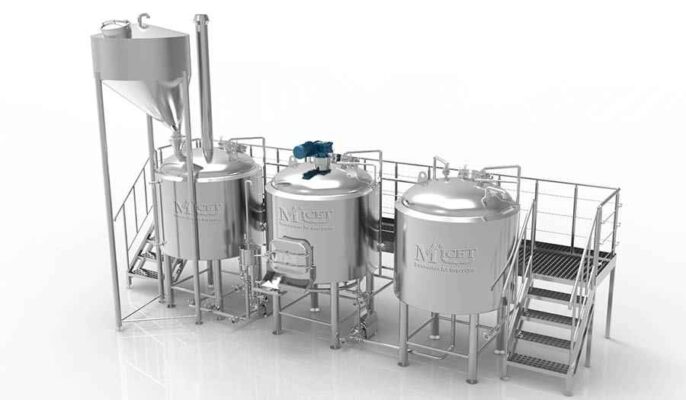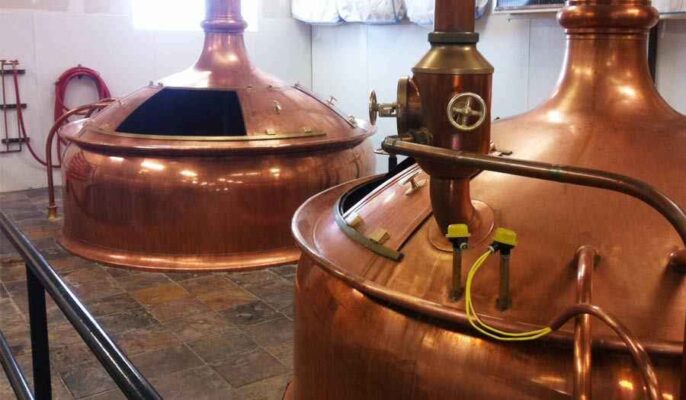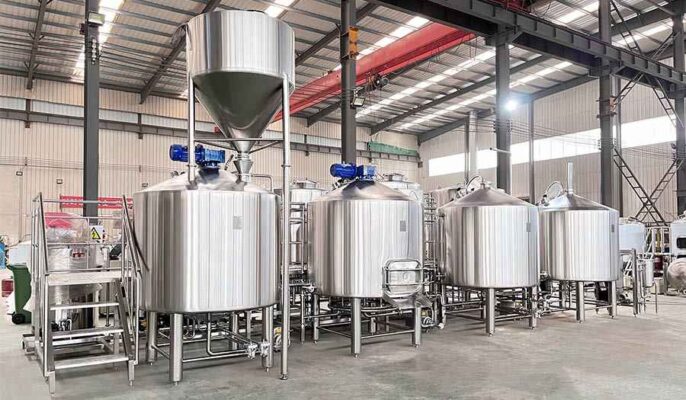The alcohol industry is one of the largest in the entire world, whether for home brewing or professional microbreweries. Professional and amateur winemakers alike invest time and effort in selecting the right equipment and raw materials to achieve a particular taste. One of the most important aspects when brewing beer is the proper equipment. Metals in brewing tanks, fermenters, and other equipment can have a big impact on flavor. Metals that are difficult to sterilize can increase the risk of bacterial growth in beer, while those prone to liquid interactions can add an unpleasant metallic taste. Due to its corrosion resistance and ease of cleaning, stainless steel has become the industry standard, but it’s not the only one.
What material is the beer equipment made of?
Copper
Copper was the preferred choice for brewery equipment before the early stainless steels came to market. Copper is still a solid choice for your brewing kettle due to its excellent thermal conductivity. It’s also the easiest metal to fabricate, making it an obvious choice for homemade custom equipment.
Copper is also easy to clean and maintain, with a healthy oxide layer giving it a dull appearance. Regular cleaning with dish soap or sodium percarbonate cleaners is usually enough to keep the copper clean and prevent oxidation.
More oxide is not always better. Copper produces a toxic blue-green oxide called verdigris. If you see a blue-green color anywhere on your brewing equipment, you need to give it a good scrub with a vinegar or oxalic acid cleaner.
Aluminum
Aluminum is a respectable brew jug, but it shouldn’t be used for long-term storage of beer. Its thermal conductivity is about half that of copper, but still better than stainless steel. Despite its flaws, aluminum does have one important advantage over copper—under normal brewing conditions, it won’t corrode beer or add any metallic flavor to beer. Long-term contact with other metals will corrode, but short-term contact is not a problem.
Aluminum can be cleaned with almost the same cleaners as copper. The inability to use alkaline cleaners on aluminum is a problem for professional winemakers. They needed a quick and effective way to sanitize, and being limited to mild cleaners meant more work with less efficient tools.


Stainless steel
Stainless steel is the industry standard for breweries, and most home breweries dream of having all stainless steel equipment. Stainless steel is available in various grades. Some are great for brewing, while others are a step above carbon steel.
Stainless steel is available in 304 and 314 grades, with 304 being the cheap version and 316 being more corrosion resistant and priced to match. Never use low grade stainless steel or cheap substitutes. Low-grade stainless steel isn’t much better than regular steel, and may give your beer a distinct iron flavor. It’s more susceptible to corrosion and pitting, and won’t last as long as the real thing.
How to Sanitize Stainless Steel
Even high-grade stainless steel can corrode and develop odors if not cleaned . While it can be cleaned with harsher cleaners than copper or aluminum, there are still some cleaners that should be off limits. As with all metals used in breweries, bleach has been phased out. Other oxidizing cleaners are generally safe. A percarbonate cleaner is recommended for daily hygiene. The best heavy-duty options are labeled stainless steel cleaners or oxalate-based kitchen cleaners.
Why Most Brewery Equipment Is Made Of Stainless Steel
Industry Development Trend
Most breweries produce alcoholic beverages in stainless steel barrels or tanks, but there are some exceptions. One of the main reasons breweries are making this shift is because they are part of a larger industrial transformation. This material change could also improve the efficiency of the production and shipping process.
Stainless steel equipment is easier to maintain
This is one of the biggest advantages of using stainless steel equipment. From unwanted residue to waste, stainless steel can end these substances.
Stainless steel watertight
Since the material is quite tough, it is very difficult for stainless steel equipment to leak of any kind.
Stainless Steel Absorbs Chemicals
While both wood and stainless steel can be used to ferment beer, a huge advantage of using stainless steel is its ability to completely cut any chemicals leaching from the brewing equipment into the fermenting beer. This keeps it fresh and fresh for much longer than cask-brewed wine.

Common applications of stainless steel in the beer industry
- Kettle or brewing tank
- Mix and match
- Fermentation tank
- Bright tank
- Beer cooling system
- Pipeline system
- Valves and accessories




